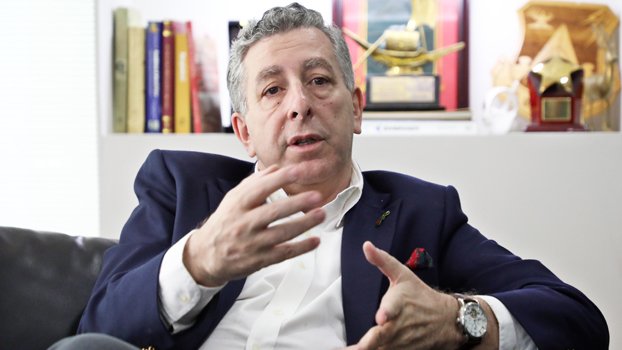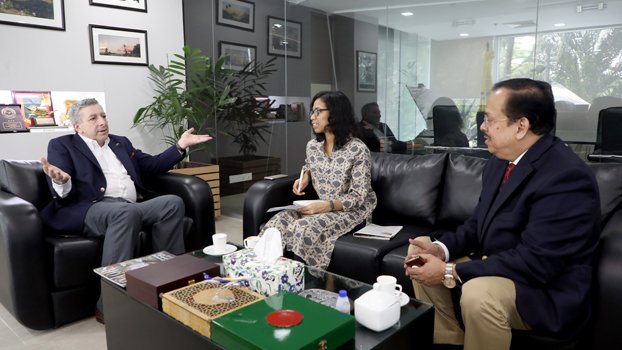‘Solidarity to bring BD, Brazil closer’

Bangladesh and Brazil can accomplish many things together through solidarity, said the Brazilian Ambassador to Bangladesh, Joao Tabajara de Oliveira Junior.
Talking to Bangladesh Post, the diplomat expounded his views on how Bangladesh and Brazil can cooperate with each other in the field of trade and commerce in years to come. He also explained how both the nations could explore the potentials of each other and perhaps find new avenues for common business interests, especially agro-based trade where Brazil has many innovations to share.
“We are very keen to have direct trade relations with Bangladesh. Brazil has a capacity and tendency to cooperate without any political or commercial conditionality.”
He emphasized on how cooperation in agriculture can be good for Bangladesh. “Bangladesh wants to diversify its cotton sources, and Brazil could be the country to export this cotton. Brazil is exporting 14 percent (pc) of what Bangladesh imports, but we wish to take this figure close to 30pc," he said.
Regarding the development of agriculture in Bangladesh, he said, “Brazil is to become world’s largest grain exporter in five years despite using only 8 pc of its land, which is the double of Bangladesh’s region. The technologies, systems and methods of production that Brazil developed in the last four to five decades, can be used here to bring revolution in the agriculture of Bangladesh. The production of crops can be multiplied by four times with the methods and techniques used in Brazil. Bangladesh produces more rice than it consumes. He suggested diversifying into new crops.”
“About 12 years ago Brazil was the third largest importer of cotton and now it is the second largest exporter of cotton. The secret is in methods, system and management. This is what caused a revolution in agriculture in Brazil,” Oliveira added. Agro-economy

“Brazil heavily invested in agriculture in the last few decades making efforts to develop the agro based economy of Brazil. The nation always focused on developing agriculture since its independence in 1822. An immigration policy was framed to allow receiving immigrants from all over the world including Germany, Russia and Ukrain for this purpose. Alysson Paolinelli, the Brazilian minister of agriculture during 1970s, nominated for the Nobel Peace Prize in 2021, played a very important role in creating a revolution in the agriculture of Brazil,” said the Ambassador.
“One of the ideas that I speculated when I arrived here was, if we had a Brazil-Bangladesh chamber here and one Brazil-Bangladesh chamber in Brazil we could have a bridge and it would be easier. Brazil-Bangladesh Chamber of Commerce and Industries (BBCCI), inaugurated in January, will create a lot of opportunities for businessmen who want to explore,” said the diplomat.
The Brazilian envoy Oliveira mentioned that there are Brazilian companies which are interested in investing here and looking for partners to establish a new type of eco-friendly cement factory that is cheaper than regular cement.
“The factory along with this innovative cement will also manufacture eight other products for housing and construction. Furthermore, it will reduce construction time as it dries faster. However, it cannot be substituted for cement, as its usage has some limitations,” he said.
Another company interested in investing here, produces a liquid substance to prevent coal pollution and protect it from humidity and rain. He also mentioned about an innovative water purifier powered by battery and solar energy that can be used to provide purified water to 140 people per day and would be great for the flood prone regions of Bangladesh as it could turn flood water into purified drinking water.
“The establishment of the chamber has already created investment opportunities for Bangladesh within only a period of two months despite the pandemic. We are on the verge to signing a technical cooperation agreement so that we can share cooperation through solidarity. Bangladesh could export more and import less using proper methods and systems in agriculture utilizing the existing agricultural lands,” he explained.
In a reply to a query the envoy said, “Bangladesh has to be more aggressive in terms of attracting investments. Brazilian companies consist of 50 pc of Latin America’s GDPs. Brazil can offer Bangladesh a new market and provide an opportunity to reach Latin America. I envision to organize this road show in Brazil to attract companies from Argentina or Chili and let them know about the great advantages and potentials of Bangladesh after the pandemic, when everything is better.”
He went on saying, “There is a lot to be done mutually. The size of a country is not important, it is the size of the economy and the market that’s important. We have to explore new ways of economic trade associations and things that are not thought of. Bangladesh’s position on IMF’s ranking of GDPs is 35 which indicates the main economies in the world. We need to create basic institutional links between Brazil and Bangladesh.”.
He suggested that, if a free trade agreement could be arranged between Bangladesh and Brazil, tariff could be reduced from 35 pc to zero. Brazil imports around 6 billion dollars in textiles from the whole world and only $ 200 million worth of goods from Bangladesh. Bangladesh could benefit to a great extent from such a free trade initiative. “I believe our friendship could be stronger and such solid bonding could benefit both the countries,” a hopeful and smiling face of Oliveira added.
Describing the initiatives of Bangladesh about hosting the Rohingyas, he said, “I think Bangladesh is setting an example by doing the best thing that a country could do in these difficult circumstances. The way the Prime Minister received the Rohingyas and provided all the support, it’s simply amazing.”
Asked about how football could bring our countries closer, he said, “During the Fifa World Cup in 2018 there was a moment when I felt that I slept in Dhaka and woke up in Brazil the next day. There was Brazil’s flag everywhere. In 2018 I organized a one-month training program for four footballers from the U-15 and U-17 team of Bangladesh with a team in Brasilia. The coaches were very impressed by these footballers. This proves that we are compatible, our way and the Bangladeshi’s way of playing is very similar.”
He continued, “With a program of training, football stars could be produced in Bangladesh. Every year a batch of Bangladeshi footballers could be sent to Brazil’s football academy for a year-long training program or they could be trained here in Bangladesh under Brazilian coaches and trainers. Bangladesh could be a great exporter of talents.”
Regarding his experience so far in Bangladesh, the diplomat said “I feel at home here. The people here are friendly and open. They have good humor. I only have good memories and experiences in Bangladesh that I never had in my life.”
“We think we have to share everything we develop with another country that requires cooperation. Solidarity is the principle; Bangladesh and Brazil can do a lot together,” the Brazilian envoy concluded with a big smile.
which is the double of Bangladesh’s region. The technologies, systems and methods of production that Brazil developed in the last four to five decades, can be used here to bring revolution in the agriculture of Bangladesh. The production of crops can be multiplied by four times with the methods and techniques used in Brazil. Bangladesh produces more rice than it consumes. He suggested diversifying into new crops.”
“About 12 years ago Brazil was the third largest importer of cotton and now it is the second largest exporter of cotton. The secret is in methods, system and management. This is what caused a revolution in agriculture in Brazil,” Oliveira added. Agro-economy
“Brazil heavily invested in agriculture in the last few decades making efforts to develop the agro based economy of Brazil. The nation always focused on developing agriculture since its independence in 1822. An immigration policy was framed to allow receiving immigrants from all over the world including Germany, Russia and Ukrain for this purpose. Alysson Paolinelli, the Brazilian minister of agriculture during 1970s, nominated for the Nobel Peace Prize in 2021, played a very important role in creating a revolution in the agriculture of Brazil,” said the Ambassador.
“One of the ideas that I speculated when I arrived here was, if we had a Brazil-Bangladesh chamber here and one Brazil-Bangladesh chamber in Brazil we could have a bridge and it would be easier. Brazil-Bangladesh Chamber of Commerce and Industries (BBCCI), inaugurated in January, will create a lot of opportunities for businessmen who want to explore,” said the diplomat.
The Brazilian envoy Oliveira mentioned that there are Brazilian companies which are interested in investing here and looking for partners to establish a new type of eco-friendly cement factory that is cheaper than regular cement.
“The factory along with this innovative cement will also manufacture eight other products for housing and construction. Furthermore, it will reduce construction time as it dries faster. However, it cannot be substituted for cement, as its usage has some limitations,” he said.
Another company interested in investing here, produces a liquid substance to prevent coal pollution and protect it from humidity and rain. He also mentioned about an innovative water purifier powered by battery and solar energy that can be used to provide purified water to 140 people per day and would be great for the flood prone regions of Bangladesh as it could turn flood water into purified drinking water.
“The establishment of the chamber has already created investment opportunities for Bangladesh within only a period of two months despite the pandemic. We are on the verge to signing a technical cooperation agreement so that we can share cooperation through solidarity. Bangladesh could export more and import less using proper methods and systems in agriculture utilizing the existing agricultural lands,” he explained.
In a reply to a query the envoy said, “Bangladesh has to be more aggressive in terms of attracting investments. Brazilian companies consist of 50 pc of Latin America’s GDPs. Brazil can offer Bangladesh a new market and provide an opportunity to reach Latin America. I envision to organize this road show in Brazil to attract companies from Argentina or Chili and let them know about the great advantages and potentials of Bangladesh after the pandemic, when everything is better.”
He went on saying, “There is a lot to be done mutually. The size of a country is not important, it is the size of the economy and the market that’s important. We have to explore new ways of economic trade associations and things that are not thought of. Bangladesh’s position on IMF’s ranking of GDPs is 35 which indicates the main economies in the world. We need to create basic institutional links between Brazil and Bangladesh.”.
He suggested that, if a free trade agreement could be arranged between Bangladesh and Brazil, tariff could be reduced from 35 pc to zero. Brazil imports around 6 billion dollars in textiles from the whole world and only $ 200 million worth of goods from Bangladesh. Bangladesh could benefit to a great extent from such a free trade initiative. “I believe our friendship could be stronger and such solid bonding could benefit both the countries,” a hopeful and smiling face of Oliveira added.
Describing the initiatives of Bangladesh about hosting the Rohingyas, he said, “I think Bangladesh is setting an example by doing the best thing that a country could do in these difficult circumstances. The way the Prime Minister received the Rohingyas and provided all the support, it’s simply amazing.”
Asked about how football could bring our countries closer, he said, “During the Fifa World Cup in 2018 there was a moment when I felt that I slept in Dhaka and woke up in Brazil the next day. There was Brazil’s flag everywhere. In 2018 I organized a one-month training program for four footballers from the U-15 and U-17 team of Bangladesh with a team in Brasilia. The coaches were very impressed by these footballers. This proves that we are compatible, our way and the Bangladeshi’s way of playing is very similar.”
He continued, “With a program of training, football stars could be produced in Bangladesh. Every year a batch of Bangladeshi footballers could be sent to Brazil’s football academy for a year-long training program or they could be trained here in Bangladesh under Brazilian coaches and trainers. Bangladesh could be a great exporter of talents.”
Regarding his experience so far in Bangladesh, the diplomat said “I feel at home here. The people here are friendly and open. They have good humor. I only have good memories and experiences in Bangladesh that I never had in my life.”
“We think we have to share everything we develop with another country that requires cooperation. Solidarity is the principle; Bangladesh and Brazil can do a lot together,” the Brazilian envoy concluded with a big smile.



